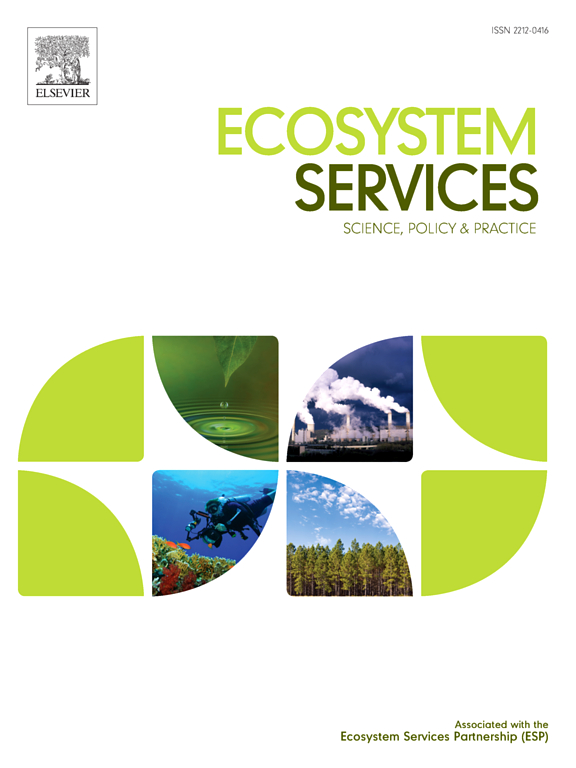Using georeferenced text from social media to map the cultural ecosystem services of freshwater ecosystems
IF 6.6
2区 环境科学与生态学
Q1 ECOLOGY
引用次数: 0
Abstract
Cultural ecosystem services (CES) are vital for enhancing human well-being, including those provided by freshwater ecosystems such as recreation, aesthetic values, and education. However, assessing these services is challenging due to their intangible nature and personal perception. Text-based social media data offers a valuable source of information for assessing CES. In this study, we developed a novel methodological framework using georeferenced text from social media to map CES of specific ecosystems. This framework is implemented through TweetMyRiver, a tool designed to extract, analyze, and classify posts from Twitter/X related to freshwater CES. By combining expert knowledge with artificial intelligence (AI) models, we ensured robustness and scalability. We developed the tool in the Ter River basin and tested it in three other river basins: the Fluvià basin in Catalonia, the Forth basin in Scotland, and the Scarce basin between France and Belgium. The results of the tool are analyzed descriptively and statistically to verify its accuracy, reliability, and applicability in different contexts. Our tool enables the analysis of CES across large areas and over time, providing insights into their distribution, drivers, and dynamics. It has the potential to inform decision-making, support conservation efforts, and contribute to sustainable ecosystem management. Future research should focus on customizing the tool for the analysis of CES in other ecosystem types, leveraging more accessible georeferenced text data, and incorporating different machine learning approaches.

利用社交媒体中的地理参考文本绘制淡水生态系统的文化生态系统服务图
文化生态系统服务(CES)对增进人类福祉至关重要,包括淡水生态系统提供的娱乐、审美价值和教育等服务。然而,由于这些服务的无形性质和个人感知,评估这些服务具有挑战性。基于文本的社交媒体数据为评估CES提供了宝贵的信息来源。在这项研究中,我们开发了一种新的方法框架,使用来自社交媒体的地理参考文本来绘制特定生态系统的CES。这个框架是通过TweetMyRiver实现的,TweetMyRiver是一个工具,用于从Twitter/X中提取、分析和分类与淡水CES相关的帖子。通过将专家知识与人工智能(AI)模型相结合,我们确保了鲁棒性和可扩展性。我们在特尔河流域开发了该工具,并在其他三个河流流域进行了测试:加泰罗尼亚的fluvion盆地,苏格兰的Forth盆地,以及法国和比利时之间的稀缺盆地。对该工具的结果进行了描述性和统计学分析,以验证其准确性、可靠性和在不同情况下的适用性。我们的工具可以对大范围和长时间的CES进行分析,提供对其分布、驱动因素和动态的洞察。它有可能为决策提供信息,支持保护工作,并有助于可持续的生态系统管理。未来的研究应侧重于定制分析其他生态系统类型CES的工具,利用更容易获取的地理参考文本数据,并结合不同的机器学习方法。
本文章由计算机程序翻译,如有差异,请以英文原文为准。
求助全文
约1分钟内获得全文
求助全文
来源期刊

Ecosystem Services
ECOLOGYENVIRONMENTAL SCIENCES&-ENVIRONMENTAL SCIENCES
CiteScore
14.90
自引率
7.90%
发文量
109
期刊介绍:
Ecosystem Services is an international, interdisciplinary journal that is associated with the Ecosystem Services Partnership (ESP). The journal is dedicated to exploring the science, policy, and practice related to ecosystem services, which are the various ways in which ecosystems contribute to human well-being, both directly and indirectly.
Ecosystem Services contributes to the broader goal of ensuring that the benefits of ecosystems are recognized, valued, and sustainably managed for the well-being of current and future generations. The journal serves as a platform for scholars, practitioners, policymakers, and other stakeholders to share their findings and insights, fostering collaboration and innovation in the field of ecosystem services.
 求助内容:
求助内容: 应助结果提醒方式:
应助结果提醒方式:


